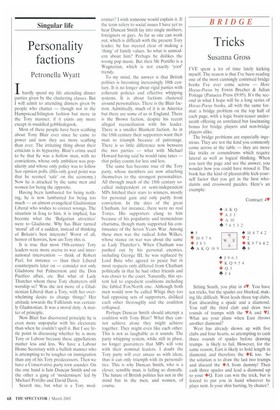Personality factions
PetroneIla Wyatt
Ihardly spend my life attending dinner parties given by the chattering classes. But I will admit to attending dinners given by people who chatter — though not in the Hampstead/Islington fashion but more in the Tory manner, if it exists any more except in muddled gobbledegook.
Most of these people have been scathing about Tony Blair ever since he came to power and now they are more scathing than ever. The irritating thing about their criticism is its hypocrisy. Blair's crime used to be that he was a hollow man, with no convictions, whose only ambition was popularity and whose only policy was to follow Sun opinion polls. (His only good point was that he seemed 'safe' on the economy.) Now he is attacked by the same men and women for being the opposite.
Having been lambasted for being nothing, he is now lambasted for being too much an almost evangelical Gladstonian Liberal who wishes to correct wrongs. The situation in Iraq to him, it is implied, has become what the 'Bulgarian atrocities' were to Gladstone. Why has Blair turned 'moral' all of a sudden, instead of thinking of Britain's best interests? Worst of all, horror of horrors, how un-Tory this is.
It is true that most 19th-century Tory leaders were more averse to war and international intervention — think of Robert Peel, for instance — than their Liberal counterparts later on — consider not only Gladstone but Palmerston and the Don Pacifico affair, etc. But what of Lady Thatcher whom these Tory chatterers still worship so? Was she not more of a Gladstonian Liberal than a Tory, with her overwhelming desire to change things? Her attitude towards the Falklands was certainly Gladstonian. It was a moral duty. A matter of principle.
Now Blair has discovered principle he is even more unpopular with his electorate than when he couldn't spell it. But I see little point in discussing whether he is more Tory or Labour because these appellations matter less and less. We have a Labour Home Secretary with a bullish manner who is attempting to be tougher on immigration than any of his Tory predecessors. Then we have a Conservative party torn asunder. On the one hand is lain Duncan Smith and on the other a gang of 'modernisers' led by Michael Portillo and David Davis.
Search me, but what is a Tory mod
erniser? I wish someone would explain it. If the term refers to social issues I have yet to hear Duncan Smith lay into single mothers, foreigners or gays. As far as one can work out, which is difficult with the present Tory leader, he has steered clear of making a 'thing' of family values. So what is unmodern about him? Perhaps he dislikes the wrong pop music. But then Mr Portillo is a Wagnerian, which is not exactly `yoof trendy.
To my mind, the answer is that British politics is becoming increasingly 18th century. It is no longer about rigid parties with coherent policies and effective whipping systems. It is about factions clustered around personalities. There is the Blair faction. Admittedly, much of it is in America but there are some of us in England. There is the Brown faction, despite his recent alleged reconciliation with his leader. There is a smaller Blunkett faction. As in the 18th century their supporters want their man to triumph because of patronage. There is so little difference now between the two parties — what with Michael Howard having said he would raise taxes — that policy counts for less and less.
The same has become true of the Tory party, whose members are now attaching themselves to the strongest personalities. All through much of the 18th century socalled independent or semi-independent MPs hitched their stars to winners, mostly for personal gain and only partly from conviction. In the days of the great Chatham, for instance, there were no real Tories. His supporters clung to him because of his popularity and tremendous charisma, though many supported his continuance of the Seven Years War. Among these men was the radical John Wilkes, whose stance on war was about the same as Lady Thatcher's. When Chatham was pushed out by his personal enemies, including George III, he was replaced by Lord Bute who agreed to peace but in most respects only differed from Chatham politically in that he had other friends and was closer to the court. Naturally, this system led to expedient coalitions including the fabled Fox/North one. Although both men would now be called Whigs they too had opposing sets of supporters, disliked each other thoroughly and the coalition collapsed.
Perhaps Duncan Smith should attempt a coalition with Tony Blair? What they cannot achieve alone they might achieve together. They might even like each other. This is not as laughable as it sounds. The party whipping system, while still in place, no longer guarantees that MPs will vote with their nominal leaders. I doubt the Tory party will ever amaze us with ideas, thus it can only triumph with its personalities. This is why Duncan Smith, who is a clever, sensible man, is failing so dismally. The future of British politics lies not in the mind but in the men, and women, of course.


















































































 Previous page
Previous page